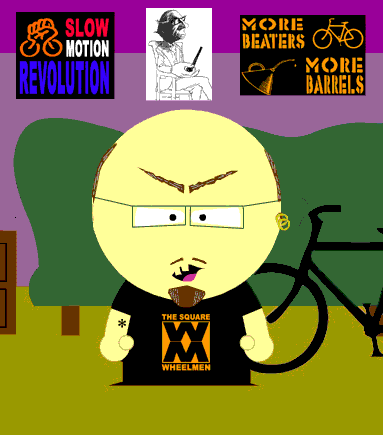Bike lessons...
from Germany & the Netherlands
 US News & World Report, 26 March 07: Andrew Curry, Berlin-based journalist covering international affairs, science, culture and history in Central Europe, reports in 30 Valuable Lessons That Americans Can Learn From the Rest of the World.
US News & World Report, 26 March 07: Andrew Curry, Berlin-based journalist covering international affairs, science, culture and history in Central Europe, reports in 30 Valuable Lessons That Americans Can Learn From the Rest of the World.Every 10th trip in Berlin is made by bike. With more than 500 miles of bike lanes and paths, rush hour in this German city of 3.4 million can be a blur of two-wheeled commuters, from suited businessmen to mothers hauling toddlers in specially designed trailers. Schools of sightseers on guided bike tours are a common sight-as are tired tourists returning to their hotels in velotaxis (cabs in which the driver pedals). Even politicians ride to work, leaning their bikes against the marble walls of parliament buildings.
Heidi Wright of the German parliament's transportation committee says cycle-friendly policies make a difference. With government support, one of Germany's biggest health insurance companies offers premium discounts for people who bike to work. A dozen federally supported cycling routes crisscross the country, promoting tourism. And simple solutions--from funding bike lanes and bike racks to requiring bigger mirrors to help trucks see bikers--combine to make riding more appealing.
Life cycle. As densely populated cities across Europe battle traffic, booming bike use couldn't be better timed. Studies have shown that for trips under 3 miles, bicycles are often the fastest alternative. Cycling mileage in London has doubled since the city began charging those who drive cars downtown up to $16 a day. High gas taxes all over Europe encourage more drivers to leave their cars parked. "Quality of life increases when cycling increases," says Wright. "We need to get that into the heads of mayors and politicians."
But even Germany will have a hard time catching up to Europe's cycling capital, Holland. Beginning in the 1970s, Dutch politicians and planners made cycling a priority. "The Netherlands has the highest share of cycling as a mode of transport in the world," says Roelof Wittink, a cycling advocate in Utrecht. More than a quarter of all trips taken in the Netherlands are by bike. Cycling's huge popularity with commuters has forced planners to tackle problems unimaginable elsewhere, like creating space for the 20,000 bicycles left at the Utrecht train station daily. Cycling is so common that the tag "cyclist" has no meaning, Wittink says: "Everyone is doing it-young people, retired people, mothers, ministers, members of the royal family."
Labels: new urbanism, pensées, rolling abroad







<< Home